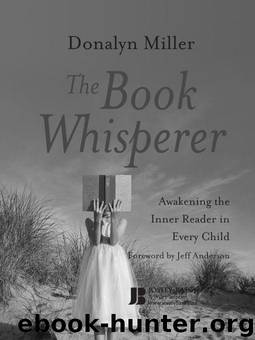The Book Whisperer by Donalyn Miller & Anderson Jeff

Author:Donalyn Miller & Anderson, Jeff [Anderson, Jeff]
Language: eng
Format: mobi, epub
Publisher: John Wiley & Sons, Ltd.
Published: 2010-05-10T22:00:00+00:00
The Need for Reading Role Models: The Crux of the Reading Crisis
My credibility with students and the reason they trust me when I recommend books to them stems from the fact that I read every day of my life and that I talk about reading constantly. I am not mandating an activity for them that I do not engage in myself. I do not promote reading to my students because it is good for them or because it is required for school success. I advocate reading because it is enjoyable and enriching. When my students think about me in the future, I want them to remember me as a reader with a book in my hand and a recommendation on my lips.
The relationships I build with my students are predominantly those of one reader to another. I am so enthusiastic about reading, so joyful about books, so willing to share my opinions and my reading experiences that my students are swept up in my love of books and want to feel it for themselves. We talk about books together all day, from the first moment I greet students in the hall until we pack up books to read at home each night. My students laugh at me when I stagger into class bleary-eyed and tell them that I stayed up too late reading my latest book. They may laugh, but they also see that reading is something I value enough to lose sleep over.
Findings from a 2007 Associated Press poll, reported in the Washington Post, indicate that the average adult American read only four books that entire year. This statistic does not tell the whole story; of the adults who read, their average was seven books, but 25 percent of the respondents did not read a book at all (Fram, 2007). Teachers fare no better on surveys of adult reading behaviors than the general population; in the 2004 article “The Peter Effect,” Anthony and Mary Applegate report that of the preservice teachers whom they studied, 54.3 percent were unenthusiastic about reading, leaving little hope that these teachers would be able to inspire students to engage in an activity they themselves did not enjoy. This data is all the more alarming when you consider that “one of the key factors in motivating students to read is a teacher who values reading and is enthusiastic about sharing a love of reading with students” (Gambrell, 1996). What is going on here? Why aren’t adults, even teachers, reading, and what is this doing to our students?
We have created a culture of reading poverty in which a vicious cycle of aliteracy has the potential to devolve into illiteracy for many students. By allowing students to pass through our classrooms without learning to love reading, we are creating adults (who then become parents and teachers) who don’t read much. They may be capable of reading well enough to perform academic and informational reading, but they do not love to read and have few life reading habits to model for children.
Download
The Book Whisperer by Donalyn Miller & Anderson Jeff.epub
This site does not store any files on its server. We only index and link to content provided by other sites. Please contact the content providers to delete copyright contents if any and email us, we'll remove relevant links or contents immediately.
| Arts & Humanities | Health |
| Language Arts | Library Skills |
| Mathematics | Reading & Phonics |
| Science & Technology | Social Studies |
The Art of Coaching Workbook by Elena Aguilar(51158)
Trainspotting by Irvine Welsh(21636)
Twilight of the Idols With the Antichrist and Ecce Homo by Friedrich Nietzsche(18618)
Fangirl by Rainbow Rowell(9228)
Periodization Training for Sports by Tudor Bompa(8251)
Change Your Questions, Change Your Life by Marilee Adams(7754)
This Is How You Lose Her by Junot Diaz(6873)
Asking the Right Questions: A Guide to Critical Thinking by M. Neil Browne & Stuart M. Keeley(5755)
Grit by Angela Duckworth(5601)
Red Sparrow by Jason Matthews(5463)
Paper Towns by Green John(5175)
Room 212 by Kate Stewart(5102)
Ken Follett - World without end by Ken Follett(4720)
Housekeeping by Marilynne Robinson(4434)
The Sports Rules Book by Human Kinetics(4378)
Papillon (English) by Henri Charrière(4257)
Double Down (Diary of a Wimpy Kid Book 11) by Jeff Kinney(4257)
The Motorcycle Diaries by Ernesto Che Guevara(4088)
Exercise Technique Manual for Resistance Training by National Strength & Conditioning Association(4058)
